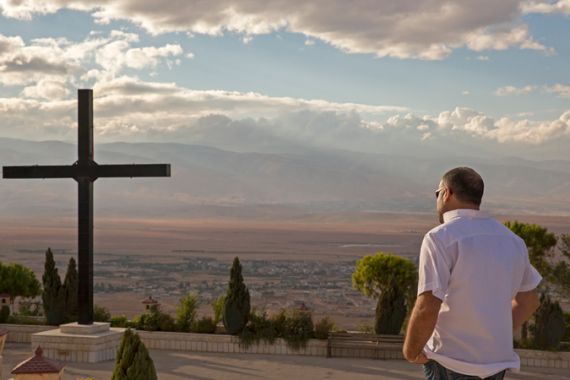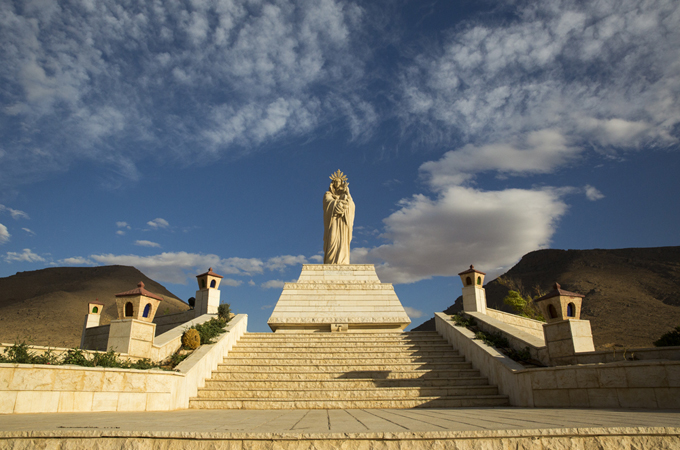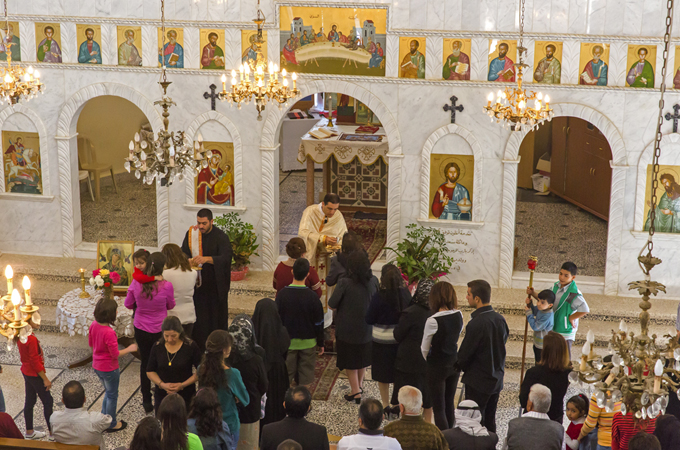Lebanese Christians ‘prefer’ Assad victory
Proximity of hardline Islamist fighters has many hoping for a Syrian government war win.

Jdeideh-Fakehe, Lebanon – Sister Jeanette’s eyes narrow and her speech slows down to emphasise every word. Sitting on the edge of the sofa, her hands grip the cushions at her sides.
“The refugee problem is affecting our lives, down to the tiny details,” she said.
Syria’s war has put a formidable burden on Lebanon with acute overcrowding the result of the nearly one million refugees who have fled here.
Sister Jeanette lists the problems the predominantly Christian Jdeideh-Fakehe community in the Bekaa Valley are experiencing: water, electricity, and food production have all been severely taxed, causing months-long shortages.
But strain on the community’s resources isn’t the worst part. The proximity of hardline rebel groups operating in Syria is now a major concern for residents here.
“Just over there,” she points east out of the window, “are ISIS [Islamic State in Iraq and al-Sham]. These are people worse than Jabhat al-Nusra, they are people who chop off heads and eat hearts.”
There is fear in my community that Salafis will install themselves here. No one trusts them because they kill Christians who have nothing to do with the war … No one wants to go back 500 years.
Sister Jeanette’s fears are similar to those of many Christians living in the Bekaa Valley. She, like many other Christians, have been driven to hope for a victory by President Bashar al-Assad’s forces in Syria – and soon.
Overcrowding, desperate fear of extremist rebels, and solidarity for Assad’s ally Hezbollah have contributed to the sentiment heard over again here from the Bekaa’s Christians: “We prefer Bashar.”
Under pressure
The influx of Syrian refugees has “severely impacted” Lebanon’s already-fragile economy and carefully maintained socio-political fabric, according to UNHCR public information officer Joelle Eid.
The result has been the worst violence the country has seen since the end of its civil war in 1990. The number of refugees is projected to reach 25 percent of Lebanon’s population by the end of the year, Eid said.
Bekaa Valley residents have perhaps been the hardest-hit in Lebanon by the fallout from the Syrian war. According to Eid, some 269,000 Syrians – 34 percent of Lebanon’s total – have moved into this impoverished region to escape the war.
Their makeshift tents are often visible from the main road that goes through the valley. Tens of thousands of others are staying with family members.
The sectarian fault lines that have developed in Syria are also appearing in Lebanon, most distinctly in Bekaa where the influence of the central government has always been weak.
Violence between Hezbollah, whose fighters fundamentally support Bashar al-Assad’s regime, and Syrian rebels and their Lebanese supporters has also escalated.
Economic woes
Towns such as Qaa, 135 kilometres northeast of the capital Beirut, have experienced a serious economic downturn since the outbreak of the war, as crucial trade dried up.
“Before the war we imported and exported crops and other goods,” Qaa’s Mayor Milad Rizk said, puffing on a water pipe in his living room. Now, the community depends on support from international aid organisations and the Lebanese government, which is insufficient, he said.
UNCHR’s Eid backs up Rizk’s view. “The level of donor funding is not enough to meet the needs of the local communities hosting the growing refugee population … The pressure on [these] communities is becoming increasingly difficult to manage.”
 |
| A large Virgin Mary statue in the hamlet of Qaa [Roland Ragi] |
According to residents, the only meaningful aid coming to the area is from Hezbollah, whose support for the community of Jdeideh-Fakehe has continued despite the war.
The mayor of Jdeideh-Fakehe, Toni Khoury, said that Hezbollah “helps poor Christian and Muslim families with petrol and food”.
Sister Jeanette agreed. “We receive no help from anyone but Hezbollah … They donate to our school, and give poor families food and fuel in winter,” no matter what their religion, she said.
The proximity to Syria used to be an advantage of living here. Rizk said people in Qaa would cross the border to get medical care “because our province doesn’t have a good hospital”.
Sister Jeanette also praised Assad’s government for establishing strong social programmes in Syria. “Bashar gave his people things we only dream of: schools, healthcare, agricultural assistance.”
Rebel fears
Now, however, Syria’s proximity has become not only inconvenient, but ominous.
Habib Malik, a professor of history at the Lebanese American University, said the “horrific massacres” the area has been subject to, especially during the early years of the Lebanese civil war, makes Bekaa residents wary.
“There are memories of having lived under occupation, where freedoms were deprived and there were disappearances and torture. But that’s a different level of danger than the one emanating from Salafi groups, with whom there is no negotiation; for whom, a priori, you deserve to be slaughtered simply because you are an infidel.”
Qaa has historically been the site of especially brutal violence, and Mayor Rizk said he fears it may return with the rise of the hardline rebel groups across the border.
 |
| Churchgoers take communion in Jdeideh [Roland Ragi] |
“There is fear in my community that Salafis will install themselves here,” he said. “No one trusts them because they kill Christians who have nothing to do with the war … No one wants to go back 500 years.”
The Syrian war can be characterised by impossible choices, said Malik. Earlier this year, there was a surge of support for Jabhat al-Nusra – despite its extremist stances – among even moderate Syrians who saw the disciplined rebels as the last hope for victory over Assad.
Now, with the violence and displacement showing no signs of abating, more people in Syria – and in Lebanon – are beginning to see the Assad regime as the lesser of two evils, Malik said.
“I feel bad for the Syrian people … [They] have been victims twice now: suffering from the rebels as well as Bashar. But for them – and for us as well – we prefer Bashar,” Mayor Khoury said.
Follow Stephanie D’Arc Taylor on Twitter: @sdarct